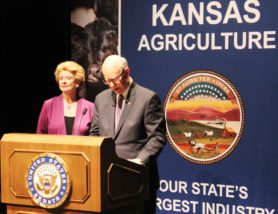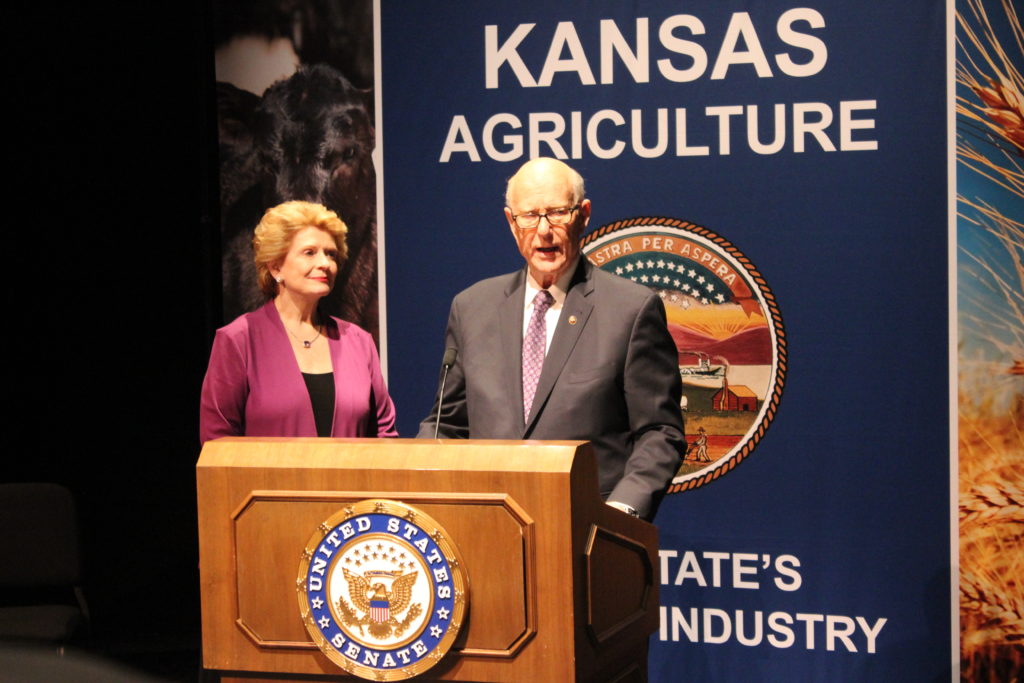
The first cornerstone of the 2018 Farm Bill was laid in McCain Auditorium on Thursday afternoon. In a time of slumping commodity prices and trade uncertainty, members of the Senate Committee of Agriculture, Nutrition, and Forestry turned to Kansas producers on advice for next years’ update.
U.S. Senators Pat Roberts (R-KS) and Deb Stabenow (D-MI) chose Kansas State University as the site for the first field hearing. Later this spring, the chairman and ranking member will pay a visit to Michigan State University for another round of panel discussions from producers.
In a media briefing before the 2 p.m. hearing, there was an air of uncertainty in Roberts’ voice. The last update to the farm bill occurred in 2014 under much better circumstances.
“Times are tough today in farm country,” said Roberts. “We’re in a rough patch — the credit situation is tightening… prices are at historic lows.”
Roberts was referring to the 2016 Kansas wheat harvest, where farmers harvested a record crop and were met with historically bad prices. While the economy may not be as bad as it was in 1933, when the farm bill was passed as part of the New Deal, trade uncertainty is also on the minds of many in the agriculture industry.
“It takes a robust, and aggressive, and transparent trade policy — and quickly. I know the President wants strong bilateral trade agreements. It’s time.”
Roberts indicated the senate ag committee will also be staving off budget cuts. Crop insurance was recently cut $6 billion, and Roberts said threats have been made for an additional $2 billion cut. However, on the other side of the farm bill, there is a silver lining. Stabenow said policy from the nutrition portion of the farm bill has saved nearly $80 billion over the last four years. Unfortunately, said Stabenow, that money cannot be transferred across the bill to be used for insurance purposes.
A small protest was also organized on the Anderson lawn by the Manhattan Alliance for Peace and Justice. Protesters carried signs advocating for the Supplemental Nutrition Assistance Program, or SNAP, which accounts for roughly 75% of the farm bill and cost nearly $89 billion in 2016. President Trump has indicated he would like to scale back SNAP and other nutrition programs.
Opening remarks were also provided by K-State President Richard Myers, Kansas Secretary of Agriculture Jackie McClaskey, and U.S. congressman Roger Marshall. The meeting was held in Kansas’ first congressional district, which is the most lucrative congressional district in the nation in terms of wheat and sorghum. The delegation of leaders stressed the importance of Kansas – and Kansas State University – in feeding a growing population and maintaining the safety of the food supply. As noted by Myers, the farm bill hearing came roughly a month after a Blue Ribbon Panel on Biodefense, where Manhattan was dubbed the “Silicon Valley of biodefense and ag research.”
More than 20 panellists took the stage from all facets of Kansas agriculture. Producers of wheat, sorghum, pork, beef, sunflowers, cotton, and everything in between were able to share their experiences in the industry and also provide insight as to how the farm bill could better serve the producers it was made to protect. Producers voiced concerns on issues regarding EPA regulations and the Waters of the U.S. law, and also expressed concern at the current state of trade agreements within the North American Free Trade Agreement.
A second farm bill hearing will be held in Lansing, Michigan, later this spring on the campus of Michigan State University.

